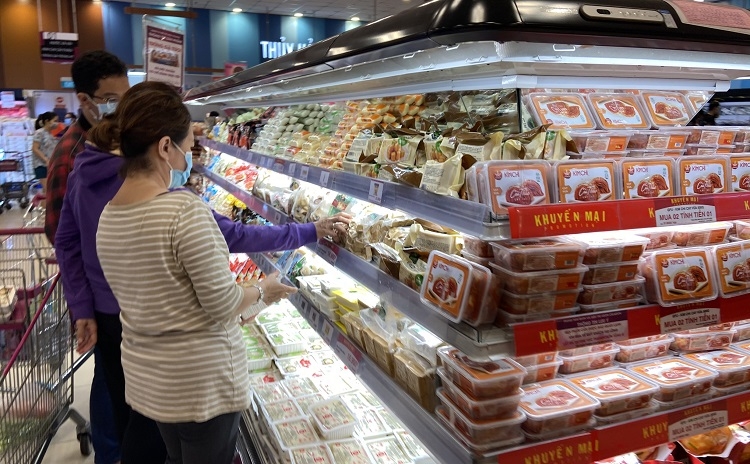Retailers committed to control rising food prices
 |
| Businesses committed to control rising food prices, illustration photo |
At some traditional markets in Thanh Xuan, Cau Giay, Dong Da, Long Bien, and Tay Ho districts of Hanoi, the average price of pork has risen from VND130,000 ($5.65) per kg up to VND200,000 ($8.70) per kg over the past week. That of beef also increased from VND250,000 ($10.90) per kg to as much as VND330,000 ($14.30) per kg, while the price of eggs and other items such as vegetables and fruits also climbed 30-50 per cent.
Many small traders said that although there is no shortage of fruit and vegetables, prices of goods are still high because a number of agricultural wholesale markets in Hanoi have ceased operations because of COVID-19 infections and the difficulties in delivering goods from neighbouring areas into the city. Similarly, slaughterhouses were also required to stop operating, causing a surge in the price of pork.
While there is variability in food prices at wholesale markets and many stores and mini-marts, large supermarkets and retailers are still committed to ensuring goods supply at unchanged prices for consumers during the social distancing period.
According to Dam Manh Tuan, director of AEON Long Bien, there are times when items such as eggs have an expansion in input prices and suffer a scarcity of supply, but the supermarket still tries to ensure sufficient supply and stable prices.
“The price of goods will depend on the needs of the people and the shortage of the goods. We believe that the shortage has only a partial effect in a short time and the demand will gradually decrease,” Tuan said.
From mid-July, AEON Vietnam has actively increased the stock of food products for three general merchandise stores and supermarkets in Hanoi, such as perishables from 200-400 per cent and groceries from 120-130 per cent. The Merchandising Department of AEON Vietnam has worked with suppliers to back up and increase the source of goods to meet the needs of the citizens. The company is also increasing the warehouse capacity, stock, the number of suppliers, and doubling delivery frequency to ensure enough goods.
From August 2, AEON Vietnam started deploying four mobile selling points in different wards in Long Bien district. The price at the selling point is the same as at AEON general merchandise stores and supermarkets, and will be listed specifically at each mobile point.
According to Hanoi Department of Industry and Trade, supermarkets are working with suppliers of wholesale markets that have been closed recently to increase the volume of stock to ensure adequate essentials on the shelves at all points of sale. However, the price of foodstuffs at traditional markets has increased due to supply and demand factors.
In order to bring food prices back to normal soon, Hanoi Department of Industry and Trade has proposed to arrange five transhipment places for goods from localities to Hanoi to cut back the stress on wholesale markets. Some 20 wholesale markets and traditional markets along with 65 food stores and supermarkets that have had to be temporarily closed will also reopen in the near future. The city is also ready to activate 2,500 mobile sales points and more than 8,200 price-stabilising selling points that have been publicly listed.
Meanwhile, foodstuff producers in Ho Chi Minh City are working hard to keep prices stables amidst supply tightness.
Pham Thi Huan, director of egg supplier Ba Huan Co., Ltd., noted that price stability plays an important role to help low-income people and workers survive the pandemic. She said that since Ho Chi Minh City implemented social distancing measures, there was a shortage of eggs in the market. However, after only one week, the company resolved the problem and continues to supply over one million eggs per day for the city.
“To avoid stocking up on foodstuff items in July, some supermarkets even required each customer to buy only two packs of eggs. After that, the market has gradually returned to normal. I have put all egg packs to price-stabilisation channels to serve the demand of the municipal residents,” Huan added.
Last week, Ho Chi Minh City People’s Committee ordered the Department of Industry and Trade to actively implement market stabilisation programmes and promote supply and demand connections. It also directed retailers such as Saigon Co.op, Bach Hoa Xanh, Lotte, AEON, MM Mega Market, and Emart to work with local authorities to assess the local demand as well as increase inventory and sales capacity.
What the stars mean:
★ Poor ★ ★ Promising ★★★ Good ★★★★ Very good ★★★★★ Exceptional
 Tag:
Tag:
Related Contents
Latest News
More News
- VIFC in Ho Chi Minh City officially launches (February 12, 2026 | 09:00)
- VNPAY and NAPAS deepen cooperation on digital payments (February 11, 2026 | 18:21)
- Vietnam financial markets on the rise amid tailwinds (February 11, 2026 | 11:41)
- New tax incentives to benefit startups and SMEs (February 09, 2026 | 17:27)
- VIFC launches aviation finance hub to tap regional market growth (February 06, 2026 | 13:27)
- Vietnam records solid FDI performance in January (February 05, 2026 | 17:11)
- Manufacturing growth remains solid in early 2026 (February 02, 2026 | 15:28)
- EU and Vietnam elevate relations to a comprehensive strategic partnership (January 29, 2026 | 15:22)
- Vietnam to lead trade growth in ASEAN (January 29, 2026 | 15:08)
- Japanese business outlook in Vietnam turns more optimistic (January 28, 2026 | 09:54)





















 Mobile Version
Mobile Version